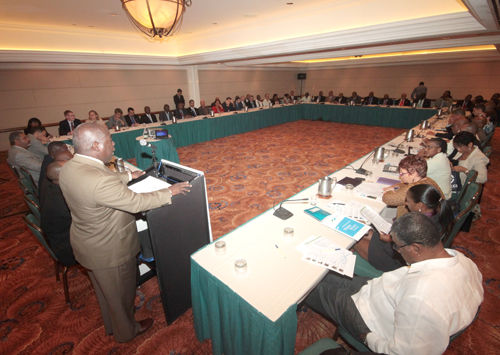
Deputy Prime Minister and Minister of Works and Urban Development the Hon. Philip Davis speaks, on October 4, 2012, at the 8th High Level Session (HLS) Ministerial Forum, which is a part of the Caribbean Water and Wastewater Association (CWWA)’s 21st Annual Conference and Exhibition, held at the Atlantis Resort, Paradise Island.
|
NASSAU, The Bahamas – Deputy Prime Minister and Minister of
Works and Urban Development the Hon. Philip Davis told his ministerial
colleagues from throughout the region and water management stakeholders
that it was a “great pleasure” for him to welcome them to the 8th
High Level Session (HLS) Ministerial Forum, which is a part of the Caribbean
Water and Wastewater Association (CWWA)’s 21st Annual Conference and
Exhibition.
“While this is the third time we have hosted the
Conference, it is the first time that the High Level Session has been
held in The Bahamas,” Deputy Prime Minister Davis said, at the opening
of the Sessions on October 4, 2012, at the Atlantis Resort, Paradise
Island.
“You might recall that, in my Conference Opening
remarks (on October 2, 2012), I noted the opportunity for technocrats,
suppliers and others to interact, share their experiences and to meet
face to face with their associates, clients, and counterparts. It is
a pleasure to note that this interaction has gone particularly well,”
he added.
“I have looked forward to this opportunity to meet
with fellow policy makers and, given my recent assumption of this office
during this past May, it is indeed perfect timing. I look forward to
our collaboration during these sessions and, indeed, long into the future.”
Because of the more than nine regional ministers with
responsibility for water management slated to attend the two-day HLS,
the event has been termed the First Caribbean Water and Wastewater Congress.
Also present at the event was Minister of State for
the Ministry of Works and Urban Development the Hon. Renward Wells.
Deputy Prime Minister Davis said that he “gratefully
acknowledged” and thanked the CWWA and the Global Water Partnership-Caribbean
for organising the HLS and the Caribbean Regional Fund for Wastewater
Management, who have helped to sponsor the event.
The Caribbean Regional fund for Wastewater Management
is made up of Inter-American Development Bank (IDB), the Global Environment
Facility (GEF) and United Nations Environmental Programme (UNEP).
Deputy Prime Minister Davis said that the theme for
this year’s HLS is “The Water and Energy Nexus in Caribbean Development”
and as Minister responsible for both water and electricity, he is required
to understand the challenges faced by both sectors.
“As a consumer of both, I have sometimes been ‘uncomfortably’
aware of the need for improvement, coordination, and reform in each
sector,” Deputy Prime Minister Davis stated.
While energy does not only cover electricity, but
areas such as transportation, Deputy Prime Minister Davis added, the
“proverbial pain” consumers feel at the gas station pumps is
often more “bearable” than that which is felt at home when water
and electrical services are less than satisfactory, coupled with what
consumers feel in their pockets at the end of the month.
“The Bahamas has few conventional energy resources
and all fossil fuels are imported to the nation at a cost in excess
of $1 billion annually or put another way, more than $3,000 per capita,”
Deputy Prime Minister Davis noted.
He said that water resources too, are very limited
and exist in sustainable quantities in only a few of the larger islands
where the populations are typically small and widely distributed.
“In the past, over 50 percent of the water supplied
to this island, New Providence, on which our capitol Nassau is located,
came from Andros, our largest island, by way of
motorised barges,” he told HLS participants.
“More and more, seawater desalination is being used because of its
quality, reliability, and the abundance of the source water.
“However, it is also an extremely energy-intensive
form of water production and treatment. For us, this dramatically
epitomises the relationship between water and energy.”
Deputy Prime Minister Davis said that whether for
production, treatment, and delivery of potable water, or the collection,
treatment and disposal of wastewater, energy is a necessary and expensive
input.
“Our challenge, therefore, is sustainability, stability,
and cost of energy, and the efficient use of water and energy resources,”
he said.
He added that his government recognises that, while
fossil fuels will remain an integral part of the energy sector for decades,
renewable energy sources are abundant in the Bahamas’ islands.
“Solar, wind, biomass, ocean currents and waves,
have all been shown to have real potential for exploitation,” Deputy
Prime Minister Davis said. “Other sources of energy, such as
waste-to-energy systems, not only provide electricity but also help
address solid waste management challenges.”
The need for more efficient use and provision of water
is critical, he pointed out, hence, the strong focus this year on reduction
of non-revenue water (water losses) and the planned focus on conservation
and education of young people.
Integrating sustainable energy and water production
is also the government’s focus as The Bahamas seeks to use renewable
sources connected directly to desalination plants, he added.
“And so, as we meet over the next two days to discuss
this ‘nexus’ of water and energy and how we can harness it for sustainable
development of our region, let our focus be on developing the necessary
policies, frameworks, collaborations, and plans, that can be implemented
to assist our people in improving their living standards while ensuring
their children’s future,” Deputy Prime Minister Davis said.
Related articles:
High School Students Attend CWWA Conference
Oakes Field Primary Visits CWWA Exhibition
